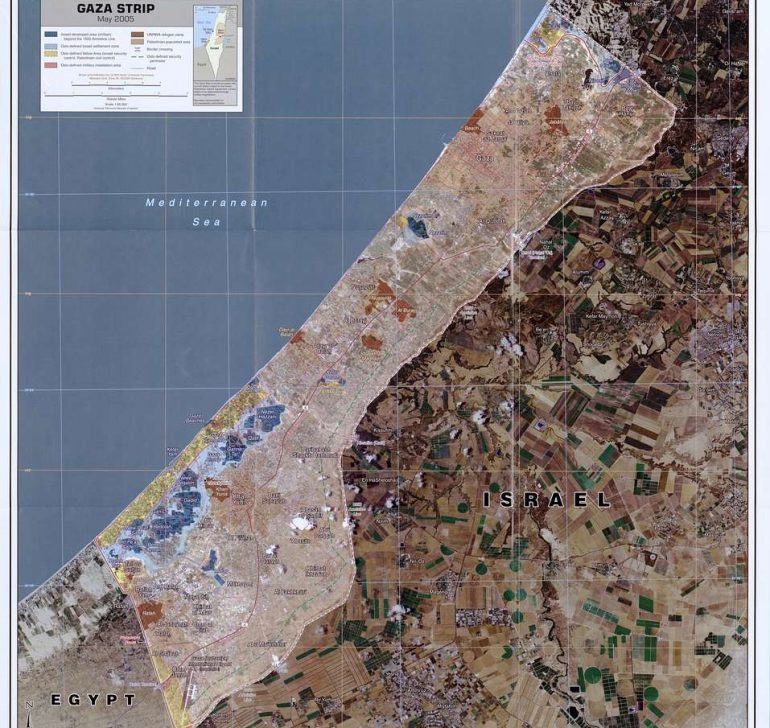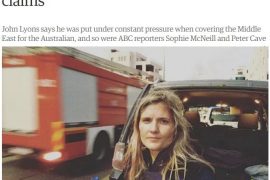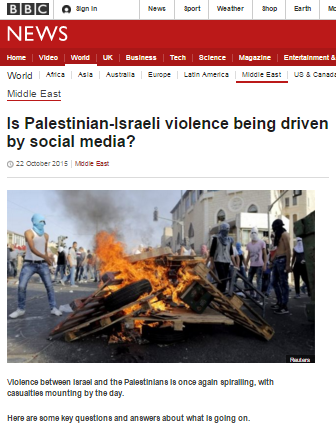The Guardian’s Bethan McKernan, the most blatantly biased Jerusalem correspondent at the outlet since Chris McGreal, recently decided not only to elide Israel’s 2005 disengagement from Gaza, but to erase it entirely.
In a Guardian article on Sept. 27th, she wrote this:
Palestinians are wary that any such deal would not result in meaningful concessions towards peace or ending the 56-year-old occupation of East Jerusalem, the West Bank and the Gaza Strip
In another Guardian article published a few days later, she wrote:
Grey rubble dust has settled on almost everything around a destroyed house in Deir al-Balah, a town in the centre of the occupied Gaza Strip, but on some shrapnel-pocked walls, the paint is still fresh and vibrant.
…
The [Israeli] restrictions caused by the occupation may limit artistic expression but it remains a lifeline for many.
To be clear, the lie that Gaza is still “occupied” seems to represent something new for McKernan. Earlier in the year, she was still accurately describing Israel’s withdrawal, as in this sentence from a January 1st article.
The militant group Hamas took over just four months after it was finished, however, leading the Israelis – who occupied Gaza from 1967 to 2005 before withdrawing their forces – to seal the frontier.
Though some NGOs (and other egregiously biased parties) still claim that – due to Israel’s Gaza-related security measures – the territory is “effectively” still occupied, other legal experts and bodies, such as the European Court of Human Rights, disagree. Further, our CAMERA colleagues have prompted many corrections to variations of the claim that Gaza is “occupied” – including at Bloomberg, CBS News, NBC News, The Washington Post the Los Angeles Times and other publications.
Similarly, we prompted a correction to the same false claim at some British outlets, including the Telegraph and the Evening Standard.
Some background:
In the summer of 2005, Israel withdrew all of its military forces, and over 9000 Israeli citizens living in 25 settlements, from Gaza, a territory they captured from Egypt during a defensive war they fought thirty-seven years earlier, leaving it under the control of the Palestinian Authority.
However, rather than improving the security, political and economic situation in the territory, and reduce friction with the growing Palestinian population there, as Israeli Prime Minister Ariel Sharon understandably hoped for, the opposite occurred.
In the 2006 Palestinian parliamentary elections, a plurality of Palestinians voted for Hamas, the Sunni Islamist antisemitic extremist group supported by Iran, dedicated to the Jewish state’s annihilation and responsible for scores of deadly terror attacks inside pre-67 Israel. Shortly thereafter, Hamas violently expelled Fatah, their main political rival, and assumed sole control of Gaza, which they’ve rule with an iron fist even since.
Multiple rounds of war, and thousands upon thousands of rocket attacks against Israeli civilian communities, traumatizing, injuring and killing scores of Israelis followed, followed.
Since Hamas came to power, Israel – like any nation faced with a heavily armed extremist militia on its border – enacted a series of security measures to protect its civilians – including a naval blockade deemed legal by a UN commission, as well as various restrictions on travel and on the territory’s import of military and dual-use items.
The Gaza withdrawal was, in the mind of most Israelis, one of the three times since the early 90s that the logic of ‘land for peace’ was proven to be far more complicated than the conventional wisdom suggested. The first such occurrence was the bloody 2nd Intifada, which occurred not only after Oslo-mandated Israeli withdrawals from large chunks of the West Bank, but, also, after Israel offered a peace proposal that, if Yasser Arafat would have accepted it, would have created a Palestinian state.
The third example relates to Israel’s unilateral withdrawal from southern Lebanon, with resulted in Hezbollah, the Iranian proxy militia, strengthening its grip on Lebanon and increasing its threat to Israel’s security.
None of this is an argument against territorial withdrawal. It’s merely a reminder of the recent real-world consequences of its implementation to the lives of millions of Israelis, and why the series of events in Gaza – as well as in the West Bank and Lebanon – are so crucial in order to properly understand the failure to reach to peaceful solution to the conflict.
Further, by erasing Israel’s contentious and painful withdrawal, and the consequences of that policy, the Guardian is obfuscating the role of decisions made by the leadership of Hamas (as well as Palestinians who voted for the terrorist group after the disengagement) for Gaza’s misery and for the periodic rounds of conflict.
As we’ve enunciated previously on these pages, the media’s failure to assign Palestinians agency, and to acknowledge how their bad decisions have led to bad outcomes, arguably represents the most serious pattern of bias in their coverage of the region. The story of Gaza reminds us that there are multiple players in the region, that decisions sometimes have unintended consequences and that not everything is in Israel’s control.
We’ve complained to Guardian editors about the error.
Related Posts
More than just victims: How the media whitewash Palestinian responsibility for the conflict






She uses as her office one of the many restaurants on Emek Refaim, Jerusalem.
She sits at her table with her iPhone and Apple laptop producing this trash whilst phoning her contacts in the PA/PLO/Hamas etc –
I actually saw her on many occasions!
I couldn’t even bring myself to finish reading this Guardian nonsense. It’s all just war propaganda aimed at the Jewish State of Israel. That’s all it is. It’s all based on faking history and political positions trying to re-cast Arabs, the dominant people of the region in a long war against a tiny Jewish minority, as the proletariat rising up to fight the revolution for workers rights against their capitalist overlords. It represents a merger of Soviet anti-Western rhetoric with Arab/Muslim supremacist aspirations to re-take earlier conquests and wrest Jerusalem et al away from the “lowly” Jews, i.e., aka “their dogs”, “the sons of apes and pigs” with their “dirty feet”.
The Guardian is full of Commie nut jobs, who are so far off the rails that many of them don’t even know it anymore, and prefer to believe that Palestine, an ancient region was named for some “very fine” Arabs who have been claiming they are the Palestinian people for some mere decades.
These mental basket cases have no religion, so “progressivism” supplies them with a narrative about “Palestine” and “Palestinians” which begins by stealing Jewish history, i.e., a people dispossessed and prevented from returning to its ancient homeland, or in the thinking of these awful racist Guardianistas replace “ancient homeland” with “natural habitat” to see how far gone the mentality really is concerning “Palestine”. For this is how they really think.
There is a special place in hell for Bethan McKernan, Chris McGreal, and the rest of the Guardian’s ghosts of Jerusalem correspondents past plus the Ben Whites, Shameless Seamuses, et al, who have come and gone like so many “well-intentioned” antisemites before them. That’s right. The international Left’s big cause, its cause of causes, is finding the Jews lacking moral, ethical, and legal integrity, (even going so far to juxtapose Israelis with the Nazis). Surprise! What has changed in jolly old Europe? I think it’s high time these bashers suffer a bloody nose. Israel needs to wield its power, rather than turn on itself, which is what these hostiles, their unchecked imperialist impulses still intact, want.